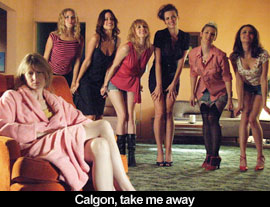Shortbus (2006) [Unrated] – DVD
***/**** Image B+ Sound A- Extras A-
starring Sook-Yin Lee, Paul Dawson, Lindsay Beamish, Justin Bond
written and directed by John Cameron Mitchell
 by Travis Mackenzie Hoover I put John Cameron Mitchell’s Shortbus on my Top Ten for 2006. This was perhaps more for intent than for execution: ’06 was a pretty lousy year for cinema, and I was just happy to see something from this continent that wasn’t completely asleep at the switch. Still, I think it’s too easy to write the movie off (as many commentators have) as pie-in-the-sky warm-fuzzies. What impressed me most about Shortbus was that its famous nudity and hardcore sex had not been severed from the rest of human experience. Mitchell may not be an aesthetic master, but he’s onto something that few of the would-be indie rebels are: that there is no separating the person from the body, and that sex is as much a social and personal experience as it is a physical one. As the social/personal body is very likely to be a morass of guilt, doubt, confusion, and fatigue, the upbeat ending suggests a covering for a core of despair.
by Travis Mackenzie Hoover I put John Cameron Mitchell’s Shortbus on my Top Ten for 2006. This was perhaps more for intent than for execution: ’06 was a pretty lousy year for cinema, and I was just happy to see something from this continent that wasn’t completely asleep at the switch. Still, I think it’s too easy to write the movie off (as many commentators have) as pie-in-the-sky warm-fuzzies. What impressed me most about Shortbus was that its famous nudity and hardcore sex had not been severed from the rest of human experience. Mitchell may not be an aesthetic master, but he’s onto something that few of the would-be indie rebels are: that there is no separating the person from the body, and that sex is as much a social and personal experience as it is a physical one. As the social/personal body is very likely to be a morass of guilt, doubt, confusion, and fatigue, the upbeat ending suggests a covering for a core of despair.

 by Walter Chaw
by Walter Chaw